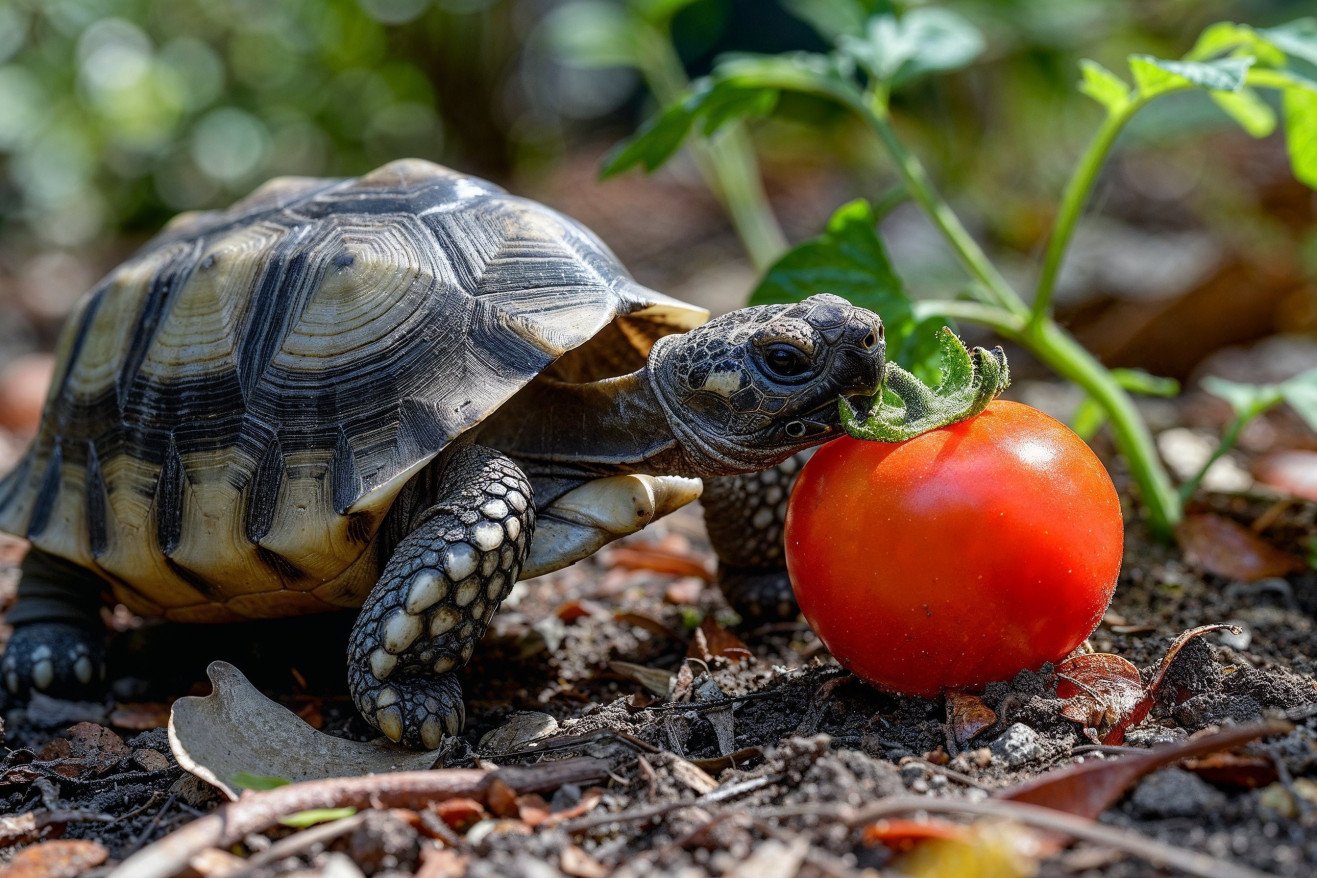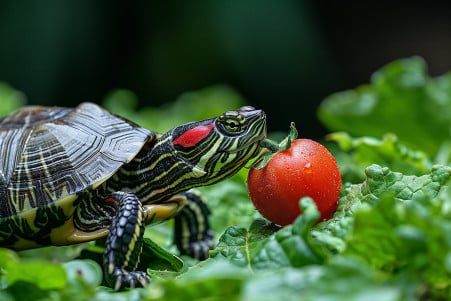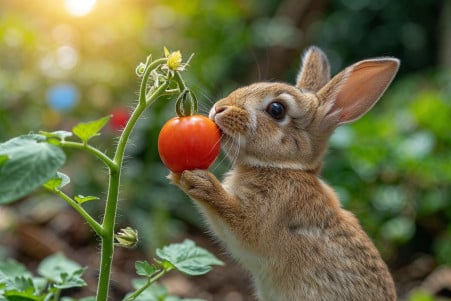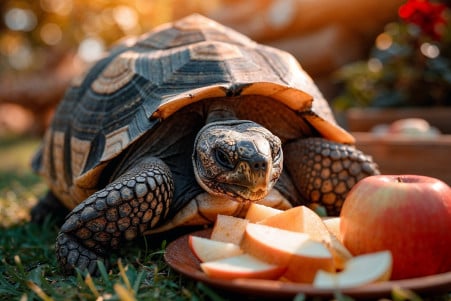Can Tortoises Eat Tomatoes? A Guide to Safe Tortoise Diet Practices
26 January 2024 • Updated 28 January 2024

Tortoises need a variety of foods to stay healthy, but how do tomatoes fit into the mix? Tomatoes can be part of a tortoise’s diet, but they should be fed in limited quantities due to their sugar content. While fully ripe tomatoes are generally OK, they should be considered a special treat, especially for Mediterranean and desert tortoises, to avoid potential dietary problems.
This article will cover the interdisciplinary research that has been done in the fields of veterinary science, herpetology, and animal nutrition to give a complete picture of what tortoises should eat and the role tomatoes can play in their diet.
By looking at research and care recommendations, we can get a better idea of what makes a tortoise healthy and how to feed them treats like tomatoes in a way that won’t hurt them. This will help you make the best decisions about what to feed your tortoise.
Can tortoises eat tomatoes?
How to Feed Your Tortoise
Tortoises have specific dietary needs that must be met in order for them to be healthy. The Merck Veterinary Manual explains that tortoises need a diet that is high in fiber, which is important for gut health and microbial fermentation, which is an important source of nutrition for tortoises.
A diet that is high in fiber and low in protein is important, and if this balance is not met, tortoises can experience fast growth and the shell deformities that come with it.
Tortoise Table explains that tortoises need to eat a variety of safe leaves and flowers, which is important for making sure that they don’t get too much of any one nutrient.
While tortoises love fruit because of its sweetness, most tortoises are not adapted to a diet that is high in sugar, according to ExoticDirect. When it comes to tomatoes, they should be a small part of a tortoise’s diet. They can help with hydration and provide vitamins, but they need to be balanced with the tortoise’s need for fiber and low sugar.
Knowing these basics helps us understand how and how often tomatoes can be included in a tortoise’s diet in a way that is safe and healthy, while always keeping in mind the needs of the tortoise’s specific species and the potential risks.
Are Tomatoes Good or Bad for Tortoises?
Tomatoes can provide water and important nutrients like vitamin C and lycopene to tortoises, but their place in a tortoise’s diet is controversial. A review in PMC found that tomatoes are a good source of phytochemicals and have been linked to a number of health benefits in humans, including protecting against cardiovascular diseases and certain cancers. However, it’s unclear how relevant these benefits are to tortoises, especially since humans and tortoises have different physiologies.
Tomatoes can be harmful to tortoises because of their high sugar and low fiber content, which can lead to obesity and digestive problems. The Tortoise Table explains that unripe tomatoes and their leaves can be poisonous because of tomatine or solanine, so it recommends that only ripe tomatoes be fed to tortoises.
Small Pet’s HQ also recommends feeding ripe tomatoes in moderation, suggests cherry tomatoes as a lower-acid option, and says that green tomatoes should be avoided.
If you decide to feed your tortoise tomatoes, it should be done in moderation. Feeding ripe tomatoes as an occasional treat, once or twice a week, and making sure they make up no more than 5–10% of the tortoise’s diet overall is a good way to make sure you get the benefits of tomatoes while minimizing the risks.
How to Tell If Your Tortoise Is Allergic to Tomatoes
While tortoises are not commonly allergic to any foods, they can develop sensitivities or allergies to certain items, including tomatoes. According to Healthline, tomato allergy is rare but it can happen, and it can be associated with other allergies, like grass pollen, in a condition called pollen-food allergy syndrome. In tortoises, an allergic reaction may cause skin, digestive, or respiratory issues.
If you decide to add tomatoes to your tortoise’s diet, make sure to do so slowly and keep a close eye on your pet for any signs of an allergic reaction. This can include a lack of energy, changes in eating habits, or changes in stool. If you notice any of these symptoms after feeding your tortoise tomatoes, stop giving them to your pet and contact your vet.
Because of the potential for allergies and the high sugar content in tomatoes, Pet Keen recommends being cautious when feeding tomatoes to your tortoise. By monitoring your tortoise for any changes after introducing new foods, you can make sure that you’re keeping it healthy and adjust its diet as necessary to make sure that it doesn’t have any negative effects.
How to Feed Tomatoes to Your Tortoise
If you decide to feed your tortoise tomatoes, opt for ripe cherry tomatoes, which are smaller, sweeter, and less acidic than other types of tomatoes. Small Pet’s HQ suggests that tomatoes should only make up 5–10% of your tortoise’s diet and should be fed to your pet once or twice a week to avoid health issues like digestive problems and calcium deficiency.
While it’s important to make sure your tortoise has a varied diet, tomatoes can be part of that variety. Make sure that you’re offering a variety of other fruits and vegetables in addition to the occasional tomato. When feeding tomatoes to your tortoise, make sure to keep the seeds and skin on, but wash them thoroughly under running water and cut them into small, bite-sized pieces.
It’s important to remember that while tomatoes can help keep your tortoise hydrated and provide them with essential vitamins, they’re also high in sugar. As a result, it’s important to make sure that you’re feeding your tortoise tomatoes in moderation to avoid any negative effects. If you follow these guidelines, you can make sure that you’re feeding your tortoise tomatoes in a way that’s safe and won’t throw off their diet.
Building a Healthy Diet for Tortoises
A healthy diet for tortoises is about more than the occasional tomato. It should focus on a variety of vegetables and leafy greens, which are important for maintaining healthy gut physiology and providing necessary nutrients through microbial fermentation, according to the Merck Veterinary Manual. Because tortoises are herbivores, their diet should be high in fiber and low in protein to prevent rapid growth and potential shell deformities.
Calcium is also important for tortoises, as it helps with bone formation and other bodily functions. However, as Crazy Critters explains, some foods that are high in oxalates can prevent the absorption of calcium. Therefore, it’s important to avoid these foods and potentially use calcium supplements to ensure the proper calcium-to-phosphorus ratio for the best health.
Tortoises also need to stay hydrated; as the Tortoise Library explains, dehydration is a common problem that can lead to other health issues. Tortoises can get the hydration they need from a combination of high-moisture foods, like pre-soaked greens and melons, and regular soaks.
In addition to tomatoes, other safe and nutritious foods for tortoises include leafy greens like dandelion, collard greens, and watercress, as well as vegetables like squash and bell pepper. By offering a variety of these foods, tortoise owners can ensure that their pet’s diet is as healthy as possible.
Final Thoughts: Taking Care to Feed Your Tortoise Well
So, as we’ve discussed in this article, tortoises can enjoy the occasional tomato as a treat, as long as it’s in moderation. The important thing to remember is to make sure that tomatoes are a small part of a diet that’s made up mostly of leafy greens, other vegetables, and the right fruits that help with everything from digestion to bone health, as the Merck Veterinary Manual and The Tortoise Table have pointed out.
This idea of being mindful of what you’re feeding your tortoise also applies to the larger idea of taking care of your tortoise. You need to be mindful of how you’re feeding your tortoise tomatoes and make sure that you’re doing it in a way that takes into account the size of your tortoise, how often you’re feeding them tomatoes, and the overall balance of their diet.
It’s also important to remember that every tortoise is different, so what works for one tortoise may not work for another. That’s why it’s always best to err on the side of caution and talk to a vet about what you should be feeding your tortoise.
Make sure that you’re always learning and understanding your tortoise’s needs as you take on the responsibility of being a pet owner. Not only will this help you make sure that your tortoise has the best life possible, but it will also help you build a stronger relationship with your pet.


